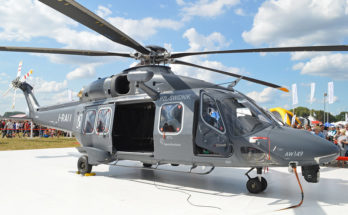by Douglas Royce, Senior Aerospace Analyst, Forecast International.
Earlier this week, the U.S. Commerce Department took Boeing’s side in an ongoing dispute with Canada’s Bombardier after Boeing claimed that an April 2016 order for 75 CSeries jets by Delta Air Lines was unfairly subsidized by the Canadian government.
MONTREAL/NEW YORK (Reuters) – The U.S. Commerce Department on Tuesday slapped preliminary anti-subsidy duties on Bombardier Inc’s CSeries jets after rival Boeing Co accused Canada of unfairly subsidizing the aircraft, a move likely to strain trade relations between the neighbors.
The department said it imposed a steep 219.63 percent countervailing duty on Bombardier’s new commercial jets after it made a preliminary finding of subsidization. Boeing has complained the 110-to-130 seat aircraft were dumped below cost in the U.S. market last year while benefiting from unfair subsidies….
What’s the significance of the new ruling?
The Commerce Department’s penalty goes into effect only if the U.S. International Trade Commission (ITC) eventually rules in Boeing’s favor. A final decision is expected to be issued in 2018, but in the meantime the dispute will remain an open wound that could impact other business the American manufacturer hopes to secure from the two governments, including a potential order for 18 new Boeing F/A-18E/F Super Hornet fighters.
Reuters noted that the Commerce Department did not disclose its methodology in calculating the tariff. It reported that the duties would more than triple the cost of a CSeries sold in the U.S. to about $61 million per aircraft, based on reports that Bombardier sold the CSeries to Delta for around $19 million per plane. Bombardier maintains that the $19 million price is inaccurate.
Delta said in a statement that neither Boeing nor any other manufacturer makes a jet that competes with the CS100 jets it ordered, which seats 100-110 passengers. However, the CSeries includes a larger model that competes against the smallest model of the Boeing 737 family, and the CSeries design contains margin for growth that could allow for a larger model that would target more of Boeing’s market share.
Why is the British government involved?
The British government isn’t pleased with the Commerce Department’s decision.
LONDON (Reuters) – British Business Secretary Greg Clark said on Wednesday he was confident he would be able to have the U.S. anti-subsidy complaint against Bombardier dismissed.
The U.S. Commerce Department on Tuesday imposed a 220-percent duty on Canadian Bombardier’s CSeries jets, whose wings are made at a Belfast plant that is Northern Ireland’s largest manufacturing employer, following a complaint by Boeing.
The CSeries’ wings are made at a Bombardier facility in Northern Ireland. Conservative Prime Minister Theresa May’s government remained in power after the last general election only because it was able to make a deal with Northern Ireland’s Democratic Unionist Party that traded additional funding for the province for its support. She will have every reason to bring the full power of her government to bear on Boeing’s battle with Bombardier.
British Defence Secretary Michael Fallon told reporters in Belfast after the Commerce Department decision was announced that Boeing’s complaint could “jeopardize our future relationship” with Boeing’s defense unit.
“Boeing has significant defense contracts with us and still expects to win further contracts. Boeing wants and we want a long-term partnership but that has to be two-way,” Fallon said.
The tariffs will hurt some U.S. manufacturers, too
The CSeries is assembled at a Bombardier facility in Canada, but the aircraft contains significant content imported from U.S. manufacturers. The Canadian government has been quick to point this out:
Canada’s foreign affairs minister Chrystia Freeland said Bombardier CSeries components are supplied by American companies that support almost 23,000 jobs in U.S. states, including Connecticut, Florida and New Jersey.
Left out of the conversation so far is the reaction of Pratt & Whitney, which makes the CSeries’ PurePower PW1500G engines, and Rockwell Collins, which makes the airliner’s sophisticated avionics system. These are just two of the many American suppliers on the CSeries program that may not be anxious to see Boeing win this fight.
Please feel free to use this content with Forecast International and analyst attributions, along with a link to the article. Contact Ray Peterson at +1 (203) 426-0800 or via email at ray.peterson@forecast1.com for additional analysis.
The Forecast International Civil Aircraft service covers all facets of the fixed-wing commercial and private aviation industry. It includes more than 70 detailed reports, complete with production forecasts on individual civil aircraft families. Four Market Segment Analyses provide in-depth examination of the markets for Large Commercial Jet Transports, Regional Aircraft, Business Jets, and General Aviation/Utility Aircraft. Included in the reports are production forecasts, a Forecast Rationale detailing the basis for the forecast, the aircraft’s price range and technical specifications, a program history, and recent developments.
A military history enthusiast, Richard began at Forecast International as editor of the World Weapons Weekly newsletter. As the Internet grew in importance as a research tool, he helped design the company's Forecast Intelligence Center and currently coordinates the EMarket Alert newsletters for clients. Richard also manages social media efforts, including two new blogs: Defense & Security Monitor, covering defense systems and international issues, and Flight Plan, which focuses on commercial aviation and space systems. For over 30 years, Richard has authored the Defense & Aerospace Companies, Volume I (North America) and Volume II (International) services. The two books provide detailed data on major aerospace and defense contractors. He also edits the International Contractors service, a database that tracks all the contractors involved in the programs covered in the FI library. More recently he was appointed Manager, Information Services Group (ISG), a new unit that encompasses developing outbound content for both Forecast International and Military Periscope.




